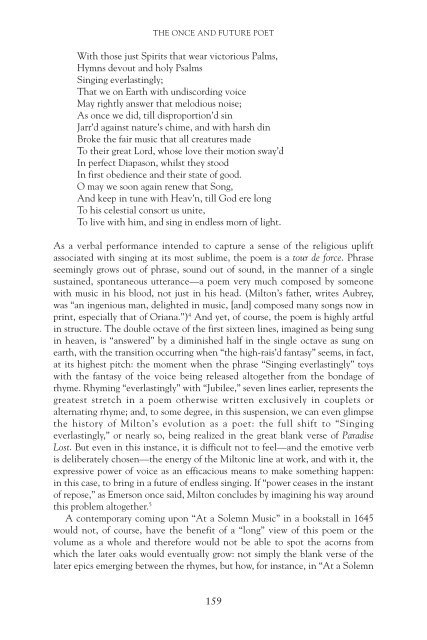ENG LYRIC POETRY.pdf - STIBA Malang
ENG LYRIC POETRY.pdf - STIBA Malang
ENG LYRIC POETRY.pdf - STIBA Malang
You also want an ePaper? Increase the reach of your titles
YUMPU automatically turns print PDFs into web optimized ePapers that Google loves.
THE ONCE AND FUTURE POET<br />
With those just Spirits that wear victorious Palms,<br />
Hymns devout and holy Psalms<br />
Singing everlastingly;<br />
That we on Earth with undiscording voice<br />
May rightly answer that melodious noise;<br />
As once we did, till disproportion’d sin<br />
Jarr’d against nature’s chime, and with harsh din<br />
Broke the fair music that all creatures made<br />
To their great Lord, whose love their motion sway’d<br />
In perfect Diapason, whilst they stood<br />
In first obedience and their state of good.<br />
O may we soon again renew that Song,<br />
And keep in tune with Heav’n, till God ere long<br />
To his celestial consort us unite,<br />
To live with him, and sing in endless morn of light.<br />
As a verbal performance intended to capture a sense of the religious uplift<br />
associated with singing at its most sublime, the poem is a tour de force. Phrase<br />
seemingly grows out of phrase, sound out of sound, in the manner of a single<br />
sustained, spontaneous utterance—a poem very much composed by someone<br />
with music in his blood, not just in his head. (Milton’s father, writes Aubrey,<br />
was “an ingenious man, delighted in music, [and] composed many songs now in<br />
print, especially that of Oriana.”) 4 And yet, of course, the poem is highly artful<br />
in structure. The double octave of the first sixteen lines, imagined as being sung<br />
in heaven, is “answered” by a diminished half in the single octave as sung on<br />
earth, with the transition occurring when “the high-rais’d fantasy” seems, in fact,<br />
at its highest pitch: the moment when the phrase “Singing everlastingly” toys<br />
with the fantasy of the voice being released altogether from the bondage of<br />
rhyme. Rhyming “everlastingly” with “Jubilee,” seven lines earlier, represents the<br />
greatest stretch in a poem otherwise written exclusively in couplets or<br />
alternating rhyme; and, to some degree, in this suspension, we can even glimpse<br />
the history of Milton’s evolution as a poet: the full shift to “Singing<br />
everlastingly,” or nearly so, being realized in the great blank verse of Paradise<br />
Lost. But even in this instance, it is difficult not to feel—and the emotive verb<br />
is deliberately chosen—the energy of the Miltonic line at work, and with it, the<br />
expressive power of voice as an efficacious means to make something happen:<br />
in this case, to bring in a future of endless singing. If “power ceases in the instant<br />
of repose,” as Emerson once said, Milton concludes by imagining his way around<br />
this problem altogether. 5<br />
A contemporary coming upon “At a Solemn Music” in a bookstall in 1645<br />
would not, of course, have the benefit of a “long” view of this poem or the<br />
volume as a whole and therefore would not be able to spot the acorns from<br />
which the later oaks would eventually grow: not simply the blank verse of the<br />
later epics emerging between the rhymes, but how, for instance, in “At a Solemn<br />
159










